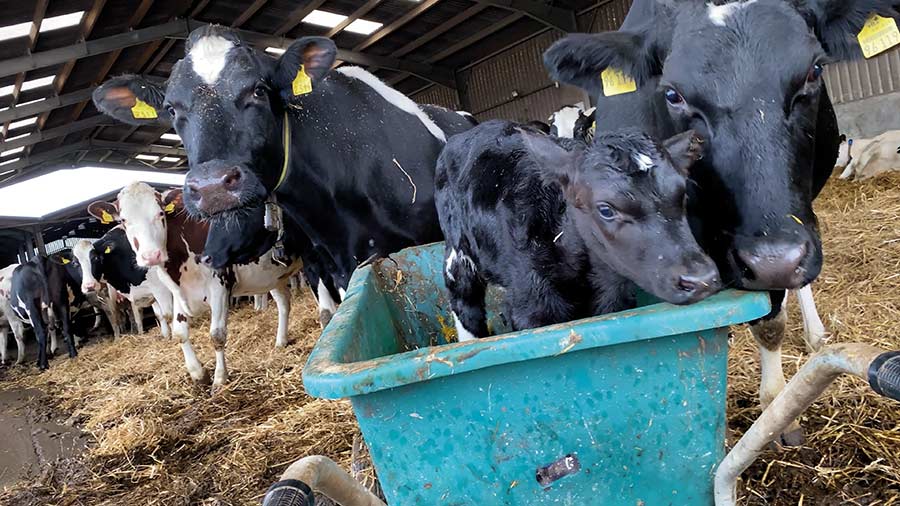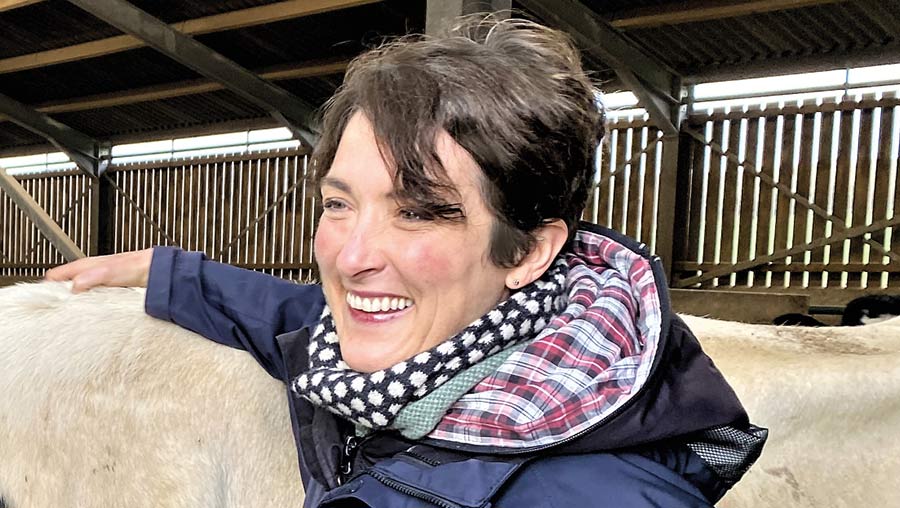Dairy farmers frustrated by poor welfare shown in TV report
 © Animal Equality UK
© Animal Equality UK Dairy farmers have reacted with dismay to a BBC Panorama programme shown on Monday (14 February) – A cow’s life: The true cost of milk – which showed examples of poor welfare practice on an unidentified Welsh dairy farm and linked it to poor margins for primary producers.
Much of the programme was filmed by an undercover representative of animal rights group Animal Equality.
See also: Read all our dairy health and welfare content in one place
The programme included scenes of calves being tipped out of a tractor bucket, cows being repeatedly kicked and punched, a dying cow left for 24 hours before a slaughterman arrived, and another “downer” cow partially raised on a telehandler and dragged across concrete to a straw bedded area.
Calf separation
More generally, the programme discussed the issue of calf separation – with experts explaining that this was better done sooner rather than later – and lameness resulting from high milk production and long-standing times.
Farm vet Roger Blowey told the programme: “It would be unusual to find any herd without lameness” and suggested lifting cows on a hoist was “common practice”.
There was a degree of “emotive” language used, for example the lines “little of that milk is destined for her own calf” and “the calves are unlikely to see their mothers again”.
The programme also contrasted “standard” dairy production with practices at The Ethical Dairy in Scotland, where calves are kept with their mothers for five months, the cows are milked once a day, and premiums are made from converting the milk into cheese and ice cream.
It also suggested the poor welfare on show was the result of low prices and tight margins. It noted that the Welsh farm in question – which was Red Tractor assured – sold its milk to Freshways, reportedly one of the lower payers.
Presenter Daniel Foggo calculated that a 2m litre dairy herd selling to one of the top five payers over seven years would have earned £240,000 more.
NFU Cymru deputy president Abi Reader told the programme that even an extra 1p/litre would enable the farmer to invest in better care facilities.
Farmer reaction
Farmers reacting to Panorama have been quick to condemn the poor welfare practices shown, but have been adamant that it is not representative of the vast majority of dairy farmers in the UK.
Taking to social media, herdsman Rob Pooley tweeted: “So disappointed by the #BBC they have shown the vile actions of those workers on dairy farms shown, but yet they won’t show the 99% other dairy farms in UK producing quality milk with the best animal welfare in the world please everyone don’t think that’s the norm #Panorama”
So disappointed by the #BBC they have shown the vile actions of those workers on dairy farms shown, but yet they won’t show the 99% other dairy farms in UK producing quality milk with the best animal welfare in the world please everyone don’t think that’s the norm #Panorama
— rob (@robpooley1) February 14, 2022
Pembrokeshire dairy farmer Steve Evans also urged: “Don’t tar all farmers with the same brush. I’m as appalled as you are about the abuse on that farm and hopefully there will be prosecutions.”
Don’t tar all farmers with the same brush. I’m as appalled as you are about the abuse on that farm and hopefully there will be prosecutions.
— Steve Evans (@Evsthetractor) February 14, 2022
Cumbrian cheesemaker Martin Gott observed on Twitter: “Yes cruelty happens on some farms, it’s never right. In my experience it’s far from the norm and actually becoming rarer.”
Panorama. Yes cruelty happens on some farms, it’s never right. In my experience it’s far from the norm and actually becoming rarer. What is becoming more common is farmers suffering mental health crises and feeling disconnected from society, compassion is the greatest of virtues.
— Martin Gott (@st_jamescheese) February 14, 2022
And Sussex dairy farmer Phil Nash, replying to a viewer who described the Panorama programme as “the last straw”, tweeted: “Please don’t think this is every dairy farm Eve, on our farm we respect and care for our cows, this is a tiny minority.”
Please don’t think this is every dairy farm Eve, on our farm we respect and care for our cows, this is a tiny minority
— Phil Nash (@PhilNash2) February 15, 2022
Animal Equality response
Animal Equality, however, has challenged this. “We have investigated four UK dairy farms over the past six years and found violent treatment of cows and/or illegalities on each one. It is never the case of just one farm or worker being a ‘bad apple’,” it said in a statement.
The group’s lawyers have submitted an official letter of complaint to Carmarthenshire County Council, the local authority where the farm featured on Panorama is based. “We are urging for the farm to be prosecuted and held accountable for its crimes.”
It has also launched a petition calling on government to implement a licensing system for farms, to increase farm inspections and to better protect farmed animals.
Opinion: Amy Jackson, Oxtale Communication, food and farming PR professional

© Amy Jackson
Following tonight’s Panorama, I think it’s time for those of us professionally involved with animals to take a long hard look at these exposés and decide this will not be tolerated in any form. Society will not, cannot and must not accept what we are seeing, and neither should we.
We know Red Tractor and supply chain standards do a good job generally, but they cannot monitor farms 24/7. If we want to build trust in what we are doing, we need to think about how we can increase accountability, increase transparency, and clearly act on what we find.
At a recent conference, a large US dairy business outlined its use of an independent company to install CCTV and monitor it, flagging areas of concern back to the farm so incidents and remediation could be tracked. If this was affordable and doable, would UK farmers consider it?
Cow-calf separation is a very tough one to solve, and it’s a shame Panorama glossed over the huge challenges farmers must overcome to make it work and the higher returns you need. But let’s at least talk about what we are trying to do while research and innovation keeps working on solving it
Bottom line – these and other actions are going to be really important if trust is to be built. Society is changing and people care. Many want to support dairy, so let’s help them.
First, there are unacceptable practices that need to be called out and stopped. Zero tolerance.
Then there’s the shoddy stuff – tired people, poor training, lack of support and sloppiness which need to be spotted quickly and remediated before they become standard practice.
Then there are things we need to change to modernise the industry and make it fit for the 21st century – demonstrating the care and respect animals deserve, that people want to see.
It means supply chains and retailers working collaboratively with farmers so they have the resources and abilities to do their best. It means end customers paying what’s needed to ensure investment can get back on farm. it means all the supply chain taking responsibility and doing better.
But most of all, it starts with the industry saying “no more, not in our name”.
